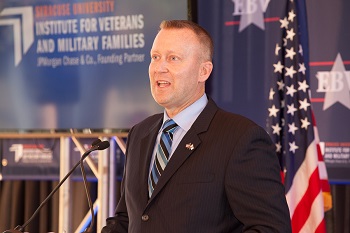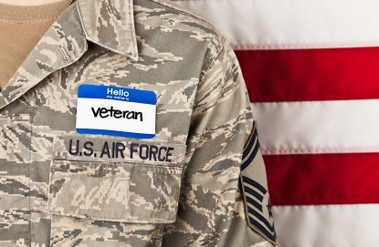Celebrating 10 Years of the EBV Program … In Service to Those Who Have Served – Part 1

By Tina M Kapral | Senior Director of Education and Training
Institute for Veterans and Military Families (IVMF) at Syracuse University
The Entrepreneurship Bootcamp for Veterans with Disabilities (EBV), is a program executed by the Institute for Veterans and Military Families (IVMF) at Syracuse University in cooperative agreement with the US Small Business Administration (SBA). This year, EBV proudly celebrates its 10-Year Anniversary, and is delivered at ten universities nationwide. It’s more than 1,300 graduates have revenues totaling over $196 million and hire on average four employees (many of whom are fellow veterans). Of these graduates, 68% of the businesses started are still in operation today.
Although EBV didn’t start that way, it began as a social venture of Dr. J. Michael Haynie, an Air Force veteran of 14 years (1992-2006), who in 2006 joined the Martin J. Whitman School of Management at Syracuse University as a professor of entrepreneurship. Dr. Haynie knew through his research that veterans were starting businesses at a much higher rate than civilians. For example, after WWII, over 48% started business, and individuals with a disability were twice as likely to start a businesses (http://www.dol.gov/odep/pubs/misc/entrepre.htm) . He realized the faculty of Whitman were teaching, training and inspiring entrepreneurs every day, so why not bring this opportunity of business ownership to the community that most deserved to live the American dream — veterans and their families.
Dr. Haynie developed the curriculum to include an online portion, followed by a nine-day residency on campus, with follow up resources and support. He wanted the EBV program to be offered at no cost to post 9/11 service connected disabled veterans with a passion for entrepreneurship. He presented his proposal to the Dean of the Whitman School. Dean Melvin T. Stith, a Vietnam veteran himself, immediately gave Dr. Haynie the approval to launch this program at Syracuse University. Now came the difficult part — raising the funds needed to support the effort, as well as recruiting veterans to participate. Dr. Haynie found supporters among Whitman alumni, who financially supported EBV; the Whitman faculty, who volunteered to teach; and business students, who helped to execute the program.
The recruitment was more difficult; Dr. Haynie found himself traveling to wounded warrior units to present the program and encountered many challenging naysayers who felt that veterans should not become business owners. Dr. Haynie would later find research proving the opposite. He noted this in The Business Case for Hiring a Veteran, Beyond the Clique’, March 2015, stating many veterans possess the same characteristics as those who are high performing entrepreneurs. “Individuals who are drawn to military service, who then have military training and socialization have a common strong self-efficacy, a high need for achievement, are comfortable with autonomy and uncertainty, and make effective decisions in the face of dynamic environments. These attributes, as they are linked to entrepreneurship and an entrepreneurial mindset among military veterans, have been consistently demonstrated in practice.” (http://vets.syr.edu/wp-content/uploads/2012/08/The-Business-Case-for-Hiring-a-Veteran-3-6-124.pdf)











